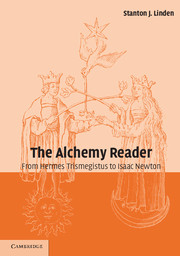Book contents
- Frontmatter
- Contents
- List of illustrations
- Acknowledgments
- List of abbreviations
- Illustrations
- Introduction
- Part I Ancient texts
- Part II Islamic and medieval texts
- Part III Renaissance and seventeenth-century texts
- 18 PARACELSUS (1493–1541): From Of the Nature of Things and Paracelsus His Aurora
- 19 FRANCIS ANTHONY (1550–1603): Aurum-Potabile: or the Receit of Dr. Fr. Antonie
- 20 MICHAEL SENDIVOGIUS (1566–1636 or 1646): From A New Light of Alchymie and A Dialogue between Mercury, the Alchymist and Nature
- 21 ROBERT FLUDD (1574–1637): From the Mosaicall Philosophy
- 22 GABRIEL PLATTES (first half of seventeenth century): A Caveat for Alchymists
- 23 JOHN FRENCH (1616?–1657): Preface to The Divine Pymander of Hermes Mercurius Trismegistus in XVII Books
- 24 GEORGE STARKEY/EIRENAEUS PHILALETHES (1628–1665?): The Admirable Efficacy, and almost incredible Virtue of true Oyl; From An Exposition Upon Sir George Ripley's Epistle to King Edward IV
- 25 ELIAS ASHMOLE (1617–1692): From the “Prolegomena” to the Theatrum Chemicum Britannicum
- 26 ROBERT BOYLE (1627–1691): From An Historical Account of a Degradation of Gold Made by an Anti-Elixir: A Strange Chymical Narative
- 27 SIR ISAAC NEWTON (1642–1727): The Key (Keynes MS 18); The Commentary on the Emerald Tablet (Keynes MS 28)
- Glossary
- Bibliography
- Index
20 - MICHAEL SENDIVOGIUS (1566–1636 or 1646): From A New Light of Alchymie and A Dialogue between Mercury, the Alchymist and Nature
Published online by Cambridge University Press: 05 October 2014
- Frontmatter
- Contents
- List of illustrations
- Acknowledgments
- List of abbreviations
- Illustrations
- Introduction
- Part I Ancient texts
- Part II Islamic and medieval texts
- Part III Renaissance and seventeenth-century texts
- 18 PARACELSUS (1493–1541): From Of the Nature of Things and Paracelsus His Aurora
- 19 FRANCIS ANTHONY (1550–1603): Aurum-Potabile: or the Receit of Dr. Fr. Antonie
- 20 MICHAEL SENDIVOGIUS (1566–1636 or 1646): From A New Light of Alchymie and A Dialogue between Mercury, the Alchymist and Nature
- 21 ROBERT FLUDD (1574–1637): From the Mosaicall Philosophy
- 22 GABRIEL PLATTES (first half of seventeenth century): A Caveat for Alchymists
- 23 JOHN FRENCH (1616?–1657): Preface to The Divine Pymander of Hermes Mercurius Trismegistus in XVII Books
- 24 GEORGE STARKEY/EIRENAEUS PHILALETHES (1628–1665?): The Admirable Efficacy, and almost incredible Virtue of true Oyl; From An Exposition Upon Sir George Ripley's Epistle to King Edward IV
- 25 ELIAS ASHMOLE (1617–1692): From the “Prolegomena” to the Theatrum Chemicum Britannicum
- 26 ROBERT BOYLE (1627–1691): From An Historical Account of a Degradation of Gold Made by an Anti-Elixir: A Strange Chymical Narative
- 27 SIR ISAAC NEWTON (1642–1727): The Key (Keynes MS 18); The Commentary on the Emerald Tablet (Keynes MS 28)
- Glossary
- Bibliography
- Index
Summary
Although many details of the life of Michael Sendivogius are obscure, there is no question as to his importance and influence on alchemical thought in the seventeenth century. Until recently, it was believed that the life of this Polish alchemist was closely entwined with that of the Scottish alchemist Alexander Seton, who was reputed to have performed successful transmutations at several European courts early in the seventeenth century. Late in 1603, at the court of Christian II, Elector of Saxony, Seton suffered a fate common to adepts who fell into the hands of avaricious monarchs; he was tortured and imprisoned for refusing to give Christian the secret of his transmuting powder. There upon Sendivogius entered the melodrama, helped the enfeebled Seton escape from Christian's prison, was rewarded with a portion of the remaining powder, and – following Seton's death in 1603 or 1604 – married his widow. Sendivogius then embarked on a career that was every bit as romantic and adventurous as that of Seton, eventually arriving in Prague at the court of Emperor Rudolf II, the “German Hermes.” Alternately enjoying courtly triumph and suffering squalid imprisonment, Sendivogius at last declined into the living embodiment of the alchemist of literary satire, dying in poverty in Warsaw at the age of eighty. Such, at least, is the legend that Sendivogius was thought to have lived until late twentieth-century researchers vindicated his name from the seamier aspects of alchemical charlatanism and emphasized his noble background and education, his contributions to chemistry, and the honors received from royal patrons.
Information
- Type
- Chapter
- Information
- The Alchemy ReaderFrom Hermes Trismegistus to Isaac Newton, pp. 174 - 190Publisher: Cambridge University PressPrint publication year: 2003
Accessibility standard: Unknown
Why this information is here
This section outlines the accessibility features of this content - including support for screen readers, full keyboard navigation and high-contrast display options. This may not be relevant for you.Accessibility Information
- 1
- Cited by
